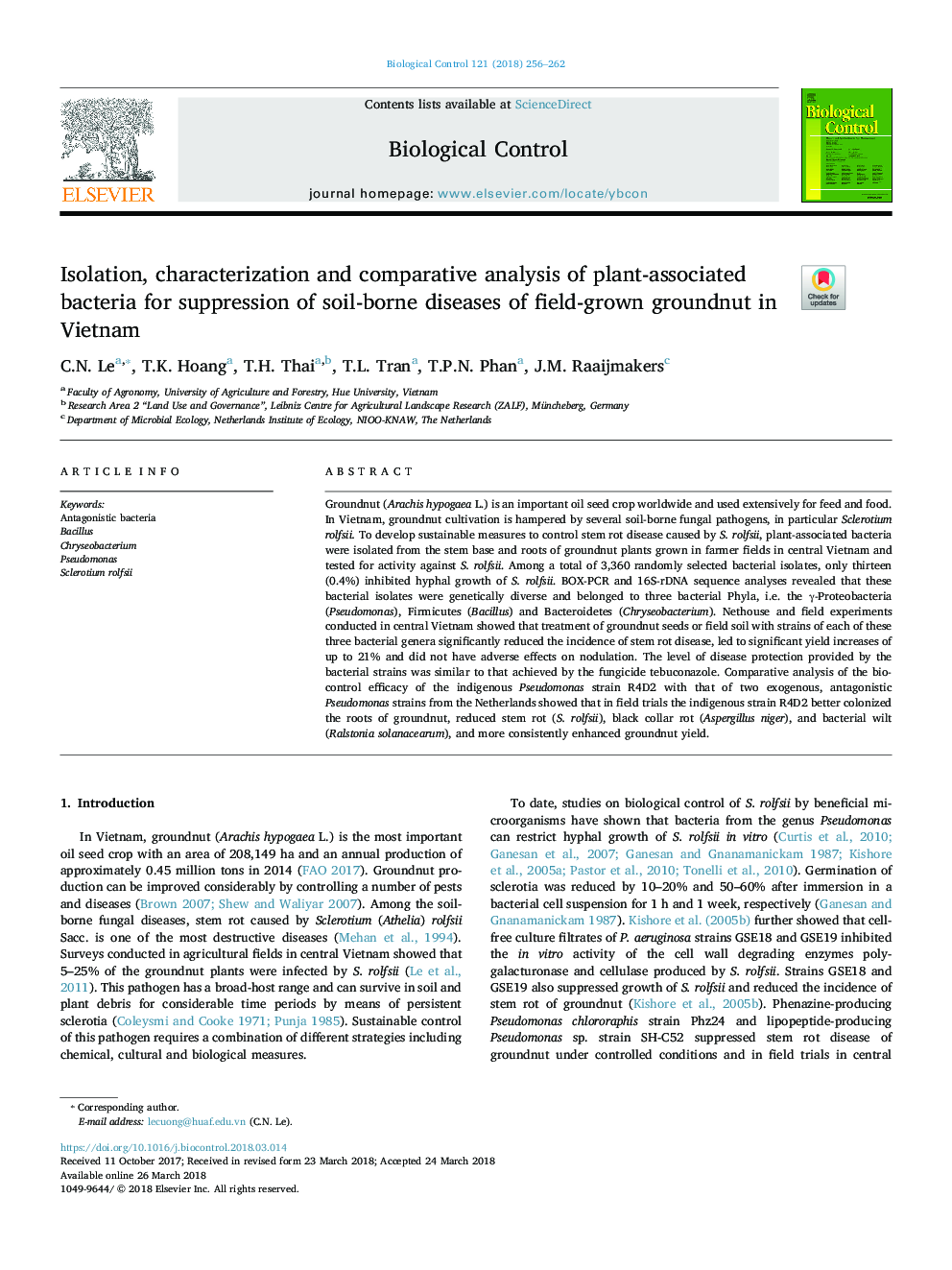| کد مقاله | کد نشریه | سال انتشار | مقاله انگلیسی | نسخه تمام متن |
|---|---|---|---|---|
| 8877694 | 1624213 | 2018 | 7 صفحه PDF | دانلود رایگان |
عنوان انگلیسی مقاله ISI
Isolation, characterization and comparative analysis of plant-associated bacteria for suppression of soil-borne diseases of field-grown groundnut in Vietnam
ترجمه فارسی عنوان
جداسازی، خصوصی سازی و تجزیه و تحلیل تطبیقی باکتری های مرتبط با گیاه برای جلوگیری از بیماری های ناشی از خشخاش سرخ شده در
دانلود مقاله + سفارش ترجمه
دانلود مقاله ISI انگلیسی
رایگان برای ایرانیان
کلمات کلیدی
موضوعات مرتبط
علوم زیستی و بیوفناوری
علوم کشاورزی و بیولوژیک
علوم زراعت و اصلاح نباتات
چکیده انگلیسی
Groundnut (Arachis hypogaea L.) is an important oil seed crop worldwide and used extensively for feed and food. In Vietnam, groundnut cultivation is hampered by several soil-borne fungal pathogens, in particular Sclerotium rolfsii. To develop sustainable measures to control stem rot disease caused by S. rolfsii, plant-associated bacteria were isolated from the stem base and roots of groundnut plants grown in farmer fields in central Vietnam and tested for activity against S. rolfsii. Among a total of 3,360 randomly selected bacterial isolates, only thirteen (0.4%) inhibited hyphal growth of S. rolfsii. BOX-PCR and 16S-rDNA sequence analyses revealed that these bacterial isolates were genetically diverse and belonged to three bacterial Phyla, i.e. the γ-Proteobacteria (Pseudomonas), Firmicutes (Bacillus) and Bacteroidetes (Chryseobacterium). Nethouse and field experiments conducted in central Vietnam showed that treatment of groundnut seeds or field soil with strains of each of these three bacterial genera significantly reduced the incidence of stem rot disease, led to significant yield increases of up to 21% and did not have adverse effects on nodulation. The level of disease protection provided by the bacterial strains was similar to that achieved by the fungicide tebuconazole. Comparative analysis of the biocontrol efficacy of the indigenous Pseudomonas strain R4D2 with that of two exogenous, antagonistic Pseudomonas strains from the Netherlands showed that in field trials the indigenous strain R4D2 better colonized the roots of groundnut, reduced stem rot (S. rolfsii), black collar rot (Aspergillus niger), and bacterial wilt (Ralstonia solanacearum), and more consistently enhanced groundnut yield.
ناشر
Database: Elsevier - ScienceDirect (ساینس دایرکت)
Journal: Biological Control - Volume 121, June 2018, Pages 256-262
Journal: Biological Control - Volume 121, June 2018, Pages 256-262
نویسندگان
C.N. Le, T.K. Hoang, T.H. Thai, T.L. Tran, T.P.N. Phan, J.M. Raaijmakers,
